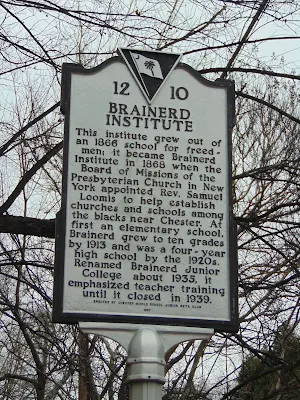 |
| Kumler Hall, the only building still standing from the historic Brainerd Institute in Chester, South Carolina. |
The Brainerd Institute in Chester, South Carolina, was one of the earliest and finest of the many private schools established for former slaves in South Carolina in the years just after the War Between The States (1861-1865).
The school which would later become the Brainerd Institute was founded by a pair of white Northern women: E.E. Richmond of New York and Carolyn Kent of New Jersey who were working with the Freedmen's Bureau.
Initially the school was opened just after the War at Brawley's Plantation -- the former home of former Confederate Veteran and later U.S. Representative from South Carolina, William H. Brawley -- about five miles outside of Chester. Brawley, then a private in the 6th SC Infantry, lost his arm at the Battle of Seven Pines in June 1862 and retired from service. He later sold the home and traveled to Europe to study law in 1864.
In early 1868 the Bureau announced that it would be closing the school. Fortunately, that same year, a visiting Presbyterian minister representing the Board of Missions for the Presbyterian Church, Reverend Samuel Loomis, was looking for a place for schools for the freemen.
That same year, with the help of Reverend Loomis, Richmond and Kent moved the school's location into the town at the Baron's Estate, a large home on the corner of Marquis and Cemetery Streets. The plantation house was the former home of Allen deGraddenrief (1764-1821) and his family.
Thus the Brainerd Institute was born and would go on to serve black children from Chester and nearby neighboring York and Lancaster Counties.
The school was named for Connecticut-born Presbyterian missionary David Brainerd (1718-1747) best known for his work with teaching the scripture to the Lenape Native-Americans (the Delaware Tribes).
From 1868 until the beginning of the 20th century, Brainerd Institute provided the only schooling available for African-American children in Chester. Originally an elementary school it served 10 grades by 1913 (the later grades would be added soon after) and it provided the only high school for black youth in Chester County until the early 1920s. The school offered vocational, industrial, mechanical, classical college preparatory, and teacher training.
Graduates from the institute often continued their education at historically black state colleges such as Allen University and Benedict College in Columbia.
The school had several distinguished alumni, which included Daniel Jackson Sanders (1847-1907), a Presbyterian clergyman who became the first African-American to serve as president of a four-year college in the South, Johnson C. Smith University, for 17 years.
The last class of Brainerd Institute also included Vivian Ayers Allen, the mother of Emmy Award nominated actress Phylicia Rashad, best known as Clair Huxtable on the NBC sitcom The Cosby Show (1984-1992).
The Brainerd Institute operated from 1868 until 1939 following a period of decreased enrollment as more public school for black students became available in the area.
The two-story brick boys dormitory, Kumler Hall, built in 1916, is the only building remaining today on the twenty-one acre campus. The building was added to the National Register of Historic Places on January 27, 1983.
 |
| Historic Marker for the institute on Lancaster Street in downtown Chester. |
 |
| A close up photo of the Kumler Hall Building, which served as the boys dormitory for the Brainerd Institute from its construction in 1916 until the school closed in 1939. |
This blogger would like to personally thank the Chester County Historical Society and the University of South Carolina archives for helping provide much of the information for this article.


No comments:
Post a Comment